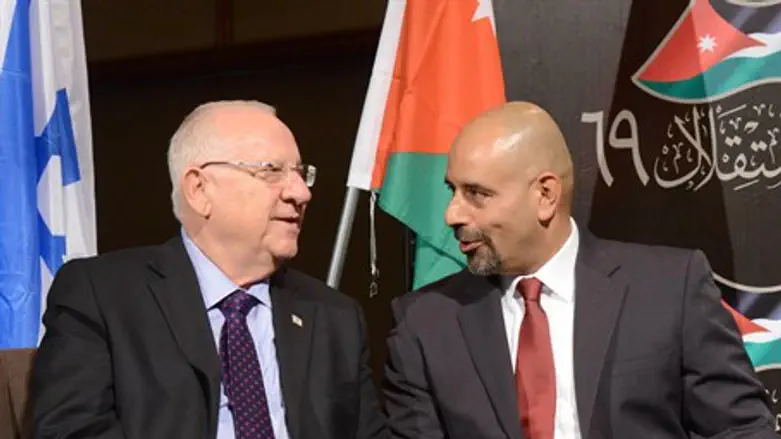
After condemning Israel for its law enforcement against Islamist radicals who attacked police on the Temple Mount earlier this week, Jordan is now threatening to recall its ambassador - as it did from last November until February.
Mahmoud Al-Akrawi, head of the department of Palestinian affairs in Jordan's Foreign Ministry, said in an interview with Al-Risalah that his country will escalate its diplomatic assault against Israel in the coming days.
When asked if Jordan intends to recall its ambassador from Tel Aviv and expel the Israeli ambassador, Al-Akrawi said his state will take "resolute national positions" if diplomatic efforts fail, and if Israel doesn't submit to the demands levied on it by Arab states.
Al-Akrawi claimed that Israel doesn't honor the 1994 peace treaty giving Jordan authority over Islamic holy sites in Jerusalem, and that it is trying to remove Jordanian control over Al-Aqsa Mosque on the Temple Mount in a plan to itself control the mosque and eventually destroy it.
The official's conspiracy theory notwithstanding, Jordan has been given de facto control of the Mount via its Jordanian Waqf despite Israel's liberation of the site in the 1967 Six Day War. The Jordanian Waqf has banned Jewish prayer at the site, in blatant disregard of Israel's laws stipulating freedom of worship.
Under the Waqf Jews have been harassed at the Mount and there have been recurring violent riots by Islamists, as occurred earlier this week during Rosh Hashanah, sparking the current diplomatic tensions.
Peace partners?
This is not the first time Jordan has spoke of recalling its ambassador, Walid Obeidat. He was recalled last November in an act of protest over talk in Israel of allowing Jews to pray on the Mount, which is the holiest site in Judaism.
Jordan has in fact threatened on several occasions recently to revoke the peace treaty so as to pressure Israel to allow the Jordanian Waqf to continue denying Jews their rights to pray at the Temple Mount.
Relations have become openly sour, despite President Reuven Rivlin's rosy words at the Jordanian embassy in June on Jordanian Independence Day.
Last November the Jordanian parliament held a special prayer session for the two Arab terrorists who committed a brutal attack on a Jerusalem synagogue, murdering four Jews at prayer and reportedly beheading two of them, as well as murdering a police officer.
Jordan's Prime Minister Abdullah Nsur also sent a letter of condolence to the families of the two murderous terrorists. Aside from its threats regarding the Temple Mount, Jordan also has been leading the Palestinian Authority's (PA) "diplomatic war" against Israel at the UN.
Jordan was established by fiat by the British in 1946 when they created a kingdom for Abdullah I of Saudi Arabia.
It is made up of a majority of Palestinian Arabs, and nearly all Arab residents of Judea and Samaria hold Jordanian citizenship, leading many to suggest creating a "Palestine" in Jordan.
That call was given even more credence in June, when PA Chairman Mahmoud Abbas called Jordanian and Palestinian Arabs "one people living in two states."